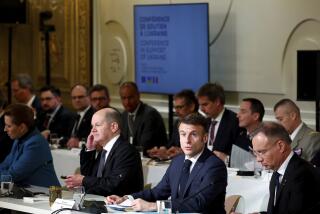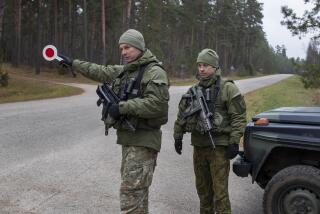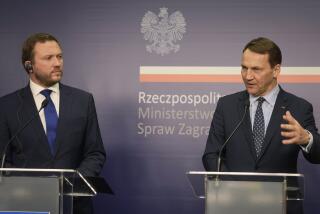Russia Softens Stand on Baltic Troop Pullout : Military: But a defense official warns it is ‘unlikely’ all of Moscow’s soldiers will be gone by 1994, as Latvia, Lithuania and Estonia demand.
- Share via
MOSCOW — Rebuffed by international criticism, Russia on Friday retreated from its decision to link a withdrawal of troops from the Baltic states to improved conditions for Russians living in Latvia, Lithuania and Estonia. But Deputy Defense Minister Col. Gen. Boris V. Gromov warned it is “unlikely” all Russian soldiers would be gone by 1994, as the Baltic states demand.
Housing shortages in Russia and the immense cost of relocating troops have forced Moscow to push back its troop withdrawal plans. Gromov on Friday predicted that the last garrison would not close until the end of 1995.
But adding a new twist to the contentious issue, he warned that the repatriation could be delayed until the end of the century unless the Baltic states allow Russia to replenish regiments already stationed there. “If the ban on bringing in young reinforcements for Russian troops is maintained in these states, Russian divisions could stay for another seven to eight years,” he said.
Infuriated by the foot-dragging, leaders in Estonia, Latvia and Lithuania vowed to present their demands for a quicker pullout to the U.N. Security Council.
Reviled as a symbol of Soviet occupation, the Russian army has been stationed in the Baltics since dictator Josef Stalin annexed the three republics in 1940. The continued presence of an estimated 90,000 Russian soldiers in the region enrages many Latvians, Lithuanians and Estonians, who regard the troops as a potential threat to national sovereignty.
On Friday, the small republics received a boost from the North Atlantic Treaty Organization, which released a statement in Brussels urging Moscow to continue the pullout “without delay.” The Council of Europe also called for the two sides to reach a “reasonable compromise.”
Although they were stunned and angered by Russian President Boris N. Yeltsin’s decision Thursday night to halt the troop withdrawal, Baltic officials expressed confidence that negotiations--and actual repatriation of Russian soldiers--would soon resume.
“This maneuver of Yeltsin’s is just a response to his internal political problems,” the surging influence of nationalist critics who accuse him of abandoning millions of ethnic Russians throughout the former Soviet empire, said Monvids Viksna, a spokesman for Latvia’s Ministry of Defense.
Yeltsin had said his decision to halt the troop pullout was linked to his worries about violations of the Russian minorities’ human rights. But Russian officials on Friday tried to separate the issues, so as to make it clear the Kremlin was not threatening the former Soviet republics.
“We are only calling on (the Baltics) to address these issues (of alleged discrimination against Russians) in a civilized manner,” Deputy Foreign Minister Vitaly Churkin told reporters, adding there was no need for anyone to get “overly excited.”
Sent to the Baltics to rebuild shattered cities and staff new industries after the Soviet Union absorbed the three small states in 1940, ethnic Russians now make up 30% of the population in Estonia and 34% in Latvia, according to statistics published this week in Moscow.
But, ironically, these Russians--the very people whom Yeltsin had vowed to defend on issues such as voting rights and language and residency laws--are wary of taking shelter in the Kremlin’s shadow and fear that his decision will prompt an anti-Russian backlash.
“Maybe this gesture will help Yeltsin win some popularity in Russia, but for the thousands of Russians in the Baltics who hoped that Moscow would help resolve their human rights problems, this decision will definitely be counterproductive,” said Alexei V. Grigoriev of the Latvian Parliament’s committee on human rights.
Yeltsin’s tougher stance toward the Baltics came a day after he banned the opposition National Salvation Front and dissolved a police guard controlled by the Parliament’s chairman. Taken together, these hard-line decrees reminded some critics of the imperious behavior of Russian czars--or of the Soviet Communists.
More to Read
Sign up for Essential California
The most important California stories and recommendations in your inbox every morning.
You may occasionally receive promotional content from the Los Angeles Times.










